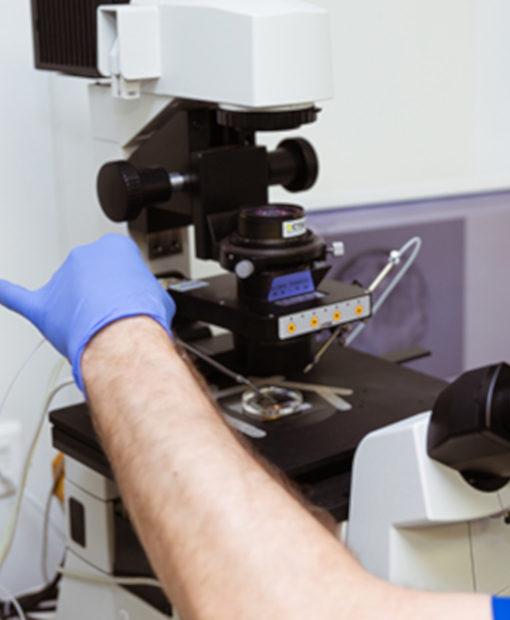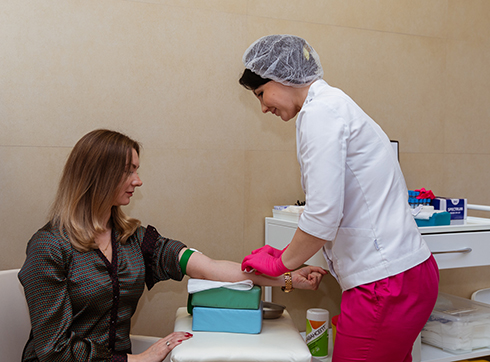Diagnosis of infertility

specialists

equipment

treatment

Difficulty conceiving often raises concerns about infertility. To dispel these fears or get treatment on time, you should contact a specialist - a highly qualified gynecologist who will prescribe the correct diagnostic methods and select the appropriate treatment.
Infertility is the inability to conceive a child even with regular sexual activity, as well as to bear a fetus. Such a diagnosis can only be made by the attending physician in a situation where pregnancy does not occur within a year of regular sexual activity. It can be temporary or permanent, affecting a woman, a man, or both partners at once. Occur due to many gynecological and even psychological problems. Very rarely, infertility is incurable. In many cases, treatment brings optimistic results. If infertility is suspected, especially in women who experience changes in the menstrual cycle, and if pregnancy does not occur within one year with regular sexual activity, partners should consult a doctor, undergo examinations and take tests, according to the results of which the doctor will prescribe treatment.
If infertility treatment was unsuccessful, in this case, such a problem can be solved by in vitro (artificial) fertilization. Indications for it are tubal infertility, immunological infertility, endometriosis, lack of ovulation, diseases of the pelvic organs.
Before entering the IVF protocol, a married couple must undergo several types of examinations. Some types of analyzes are limited validity period (up to 1 month), so 90% of them must be taken immediately before the procedure.
In the clinics of the K+31 Medical Center, a married couple can undergo a full course of diagnosis and treatment of infertility. Sign up for an online consultation on the website or order a call back - the administrator will contact you as soon as possible.
The most common causes of infertility are hormonal failure, genital tract infections, and various pathologies. and some chronic diseases of the genitourinary system. At the same time, in 40% of infertile couples, this disease suffers namely men. Therefore, when diagnosing infertility, it is important to identify both the female and male factors.
Causes of female infertility:
- Hormonal disorders.
- No ovulation.
- Infections in the pelvic organs.
- STI.
- Congenital pathologies of the pelvic organs, uterine cavity, cervical canal.
- Cervical dysplasia.
- Adhesions in the pelvis, uterus and fallopian tubes.
- Obstruction of the fallopian tubes.
- Tumours in the uterus (fibroids), fallopian tubes, ovaries.
- Polyps in the uterus.
- Ovarian cyst, polycystic ovary syndrome.
- Endometriosis and other pathologies of the endometrium.
- Surgeries on the pelvic organs, which can lead to adhesions, etc.
Causes of male infertility can be:
- Hormonal disorders
- Genital infections
- Congenital pathologies of the organs of the reproductive system
- Varicocele
- Immune system disorders
- Sexual dysfunction
- Ejaculatory disorders
- Impaired sperm quality
- Genetics
- others
To find out which factor, male or female, is the cause, doctors prescribe a series of tests and examinations for both partners.
Infertility in a woman can be caused by congenital anatomical anomalies, acquired diseases of the uterus, ovarian pathologies, hormonal disruptions and a number of other reasons. There are primary and secondary infertility.
- Primary infertility is infertility in women who have not previously become pregnant, do not use contraceptives and, nevertheless, pregnancy does not occur within a year
- Secondary infertility - infertility in women who have already had pregnancies
It is known that the pituitary gland is responsible for the production of hormones that stimulate the reproductive organs. In women, it secretes the hormone FSH and LH, which control the menstrual cycle and ovulation. Thus, violation of the production of hormones, their low level can cause infertility in women.
Depending on the cause, the following types of infertility in women are distinguished:
- Absolute infertility - the absence of genital organs (for example, if the ovaries, fallopian tubes, uterus were removed)
- Endocrine - due to hormonal changes that interfere with ovulation
- Immunological - the presence of antibodies (antisperm bodies) that are incompatible with the partner's immune system
- Uterine - a violation of the penetration of sperm into the female genital organs (vagina, uterus, fallopian tubes)
- Tubal - occurs due to obstruction of the fallopian tubes, which may be associated with infections, surgeries, etc.
If all available diagnostic methods are used, but the cause is not identified, such infertility is called psychogenic or unspecified infertility.
The first signs of infertility may appear at a young age. You should be wary if a girl:
- Irregular menstruation
- Menstrual cycle longer than 50 days
- Scanty periods
- Late period
- Abnormal breast development
- Low weight despite normal diet
- Insufficient growth of hair in the armpits and on the pubis and / or vice versa, hair growth in the wrong places (above the lip, on the chin, etc.)
- Signs of inflammation in the genitals (bad smell, unusual discharge, discomfort, fever)
Worrying symptoms that may be associated with infertility in an adult woman are:
- Cessation of menstruation for several months without pregnancy
- Irregular menstruation
- Coarse or scanty periods
- Pain during menstruation
Symptoms of infertility in men are not so noticeable. You should visit a doctor if you have the following symptoms:
- Hormonal changes that manifest themselves in hair loss, a change in figure (it acquires female features), a change in mood
- Very little or no semen
- Changes in testicles
- Swelling of the mammary glands
- Diabetes mellitus or other diseases of the endocrine system
- STD
- Reduced sexual desire
If pregnancy does not occur within a year or a year and a half if there is a regular sexual life, a married couple should contact a reproduction center or a specialized clinic where you can take a standard set of tests, be examined by a reproductologist, gynecologist, andrologist and other specialists. It is important that both spouses are tested.
Specialists of the K+31 clinic will conduct all the necessary examinations and prescribe adequate treatment. If necessary, the reproductologist will connect doctors of other profiles: genetics, sexologist, endocrinologist.
To identify infertility, the necessary list of tests and examinations in each case, the doctor selects individually, depending on the specific situation and the patient's condition. They include:
- Examination by a gynecologist
- Vaginal smear for pathogenic microflora, cervical mucus sampling
- Ultrasound examination (ultrasound) of the pelvic organs
- Checking the patency of the fallopian tubes
- Blood test for hormones and biochemistry
Already during the examination, it is possible to identify such obstacles to pregnancy as inflammation of the cervix or vagina, erosion of the cervix, polyps and other pathologies of the internal genital organs, which may be the cause of infertility. Additionally, if female infertility is suspected, the doctor may prescribe a blood test for a specific infectious agent, folliculometry, hysteroscopy, X-ray of the fallopian tubes, hormone testing, endometrial biopsy, evaluation of the thyroid gland, etc. The purpose of diagnosis is to establish the root cause of infertility.
At the K+31 clinic, we treat all forms of female infertility: tubal (impaired patency of the fallopian tubes), endocrine, uterine (for example, endometriosis), cervical (cervical pathology), psychological, and also of unclear etiology. Make an appointment you can visit a doctor and undergo a diagnosis of infertility in women at any time convenient for you.
Diagnosis of infertility in men
No less important is an individual approach if a man passes a test for infertility. As a rule, the first thing prescribed is an ultrasound of the prostate and scrotum, as well as a swab for infection. If it has been confirmed that the partner is not infertile, the man may also be prescribed:
- Blood test
- Urine analysis
- Post-orgasmic urine test
- MAR test
- Various ejaculate studies (sperm count, motility and viability)
- Hormonal studies
- Genetic research
- Testing for STIs and others
In our clinic, we conduct a comprehensive examination of the reproductive system of men and women. Diagnosis is aimed at finding out the causes of infertility, for effective and correct treatment. Our specialists evaluate ovulation, the state of the uterine cavity, check the patency fallopian tubes, at the same time appoint a spermogram for men. We can undergo ultrasound of the pelvic organs, hysterosalpingography, diagnostics of the state of the endometrium, the study of spermatozoa, take tests and tests for genital infections, hormones and go through many other methods to detect gynecological and andrological diseases and pathologies.
If infertility treatment fails, specialists of our clinic successfully carry out artificial insemination.
Before entering into the protocol of in vitro fertilization (IVF), the couple must pass all the necessary types of tests. According to their results, experts assess the degree of preparedness of the body for bearing the fetus and delivery. Laboratory and hardware research allows to identify contraindications to medical procedures, possible risks and limitations, and the need for additional infertility treatment.
To determine the current state of the patient, specialists of the Reproductology Center assign a basic list of tests. In general, the list of necessary studies for a woman includes the delivery of urine, blood and a swab from the genitals.
Functional diagnostics:
- Fluorography
- Breast ultrasound
- ECG
- Mammography
- Ultrasound of the thymus
- Echocardiography
Both spouses should be examined, because in 30% of cases, problems with conception are associated with dysfunction of the reproductive system both partners. Previously, men consult with a urologist-andrologist who conducts an initial examination and assigns the necessary types of examinations to the patient.
Blood test for:
- Rh factor and group
- Herpes virus immunoglobulins
- Hepatitis B and C immunoglobulins
- Immunoglobulins for syphilis and HIV
Analysis of seminal fluid:
- MAR test
- Spermogram
All in vitro fertilization programs are preceded by a thorough examination and preparation of future parents. In case of diagnosing serious diseases, the doctor prescribes the necessary treatment, the passage of which increases the chances of success in vitro fertilization. The better the body is prepared for bearing the fetus, the easier it will be for pregnancy and childbirth.
The IVF procedure is not carried out without a preliminary examination of the couple. The first thing that establishes a comprehensive diagnosis is this is the possibility of conception and gestation for 9 months. To determine the degree of preparedness of the body for pregnancy and childbirth need to be examined by several highly specialized doctors:
Based on the results of the research, a treatment plan is developed. The day before the operation, the patient undergoes complex anti-inflammatory and antibacterial therapy.
After the exclusion of serious diseases in future parents, they begin a detailed study of the functional capabilities of the reproductive system. Specialists determine the causes of infertility, diagnose and treat diseases that prevent fertilization and childbearing.
Both a woman and a man can suffer from infertility, so both spouses should undergo an examination before IVF. The principles of treatment are determined by the results of laboratory and hardware studies. The received data will depend on:
Not a single fertility clinic will treat infertility patients without a preliminary examination. Passing tests and developing an individual strategy for managing patients increases the chances of successful conception and the course of pregnancy.

Appointment to the doctor
Appointment with an oncologist-mammologist (you must bring the results of breast ultrasound and mammography with you).
The conclusion of the general practitioner about the general condition of the patient: the possibility of infertility therapy and trouble-free childbearing.
In the absence of absolute contraindications to IVF, the patient is prescribed a course of infertility treatment. Its duration depends on the causes of violations in the reproductive system.
After the doctors decide on the couple's entry into the IVF protocol, future parents will have to radically change your lifestyle for the next few months. In particular, this applies specifically to patients, since their behavior and compliance with medical recommendations will largely depend on the effectiveness of the procedure. For it to be successful, you need:

In the K+31 clinic (Moscow), women are tested for infertility by highly qualified specialists with extensive experience, armed with which have innovative techniques and the most modern equipment. On our website you can find out the price for the diagnosis and treatment of infertility for women (in rubles), read the news of the Center, and also sign up for a consultation with a doctor.
Price
Make an appointment at a convenient time on the nearest date
Our doctors

This award is given to clinics with the highest ratings according to user ratings, a large number of requests from this site, and in the absence of critical violations.

This award is given to clinics with the highest ratings according to user ratings. It means that the place is known, loved, and definitely worth visiting.

The ProDoctors portal collected 500 thousand reviews, compiled a rating of doctors based on them and awarded the best. We are proud that our doctors are among those awarded.












